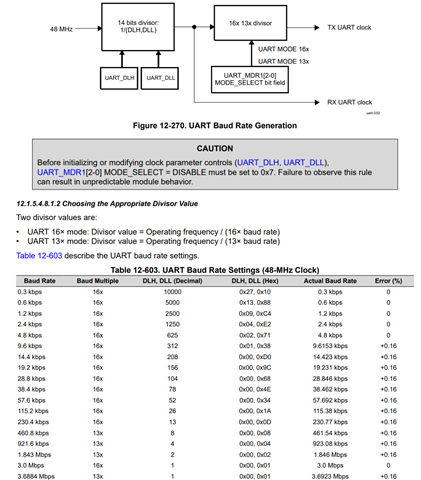- Ask a related questionWhat is a related question?A related question is a question created from another question. When the related question is created, it will be automatically linked to the original question.
This thread has been locked.
If you have a related question, please click the "Ask a related question" button in the top right corner. The newly created question will be automatically linked to this question.
Part Number: SK-AM64
Hello,
from the datasheet, I saw the UART has a 48Mhz main clock with sampling rate 16/13. So the max baud rate would be 48M/16=3M or 48/13=3.6923M.
But it is said to be 3.6864M max. my question is, why the small difference here?
Thanks a lot,
Leon
Hello Leon Change,
Thank you for the query. I assume you are referring to section 12.1.5 Universal Asynchronous Receiver/Transmitter (UART) of TRM
Here are a few general notes about UART interface
UART communication implies asynchronous communication.
When 2 devices communicate between each other, to maintain compatibility, for faster and error free communication both the devices are expected to be set to standard defined baud rates
For lower speeds Auto-baud is an option, For higher speeds a common baud rate is set for the 2 communicating devices.
AM64 specs (reference Datasheet)
8.4.2.21 UART
The UART module supports the following main features:
• Baud rate from 300 bps up to 3.6864 Mbps (subject to functional clock frequency)
• Auto-baud between 1200 bps and 115.2 Kbps
* please note the text in bold.
Below is the table from the TRM. used for explaining

The 48 MHz clock is generated from the function clock frequency ( crystal connected between MCU_OSC0_XI, High frequency oscillator input and MCU_OSC0_XO High frequency oscillator output)
Baud rate is the the standard baud rate set for communicating between 2 devices
Actual Baud rate is the closet baud rate with respect to the set baud rate that can be achieved by the SoC and varies with variation in clock parameters.
The Error(%) is the error in communication resulting due to the mismatch between baud rate ad actual baud rate. This is the baseline error that is going to exist.
In the Error(%) some of the rows show error to be 0. Using these baud rates improves the communication error.
For additional details please refer to
https://www.ti.com/lit/gpn/am6442
https://www.ti.com/lit/pdf/spruim2
Regards,
Sreenivasa
Hello Leon,
Thank you for the note. Happy to support and have a great day.
Regards,
Sreenivasa